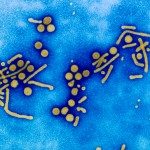Link to Pubmed [PMID] – 8810318
J. Biol. Chem. 1996 Oct;271(41):25479-84
The antiproliferative functions of interferons result from specific effects that these cytokines exert on several cell cycle-controlling genes. The possible coupling between the interferon-responsive genes that are directly transactivated by the interferon signaling and the genes that constitute the basic machinery of the cell cycle is not clear yet. We report in this work that interferon-induced double-stranded RNA-activated kinase (PKR) is one of the specific mediators of the antiproliferative effects of the cytokine. Transfections of M1 myeloid leukemia cells with two catalytically inactive mutant forms of PKR abrogated the ability of interferon to suppress c-Myc without interfering with the pRB/cyclin D responses. As a consequence, these genetically manipulated cells displayed a small but significant reduction in their growth sensitivity to interferons, a phenotype that characterizes a single pathway disruption. Transfection of the parental M1 cells with the functional wild-type human PKR restricted their proliferation in the absence of interferons. This PKR-mediated growth inhibition could be efficiently rescued by the ectopic expression of deregulated c-myc. Taken together these results prove the existence of direct or indirect links between PKR and c-Myc suppression, thereby placing this gene along one of the complementary growth suppressive pathways that are triggered by interferons.
